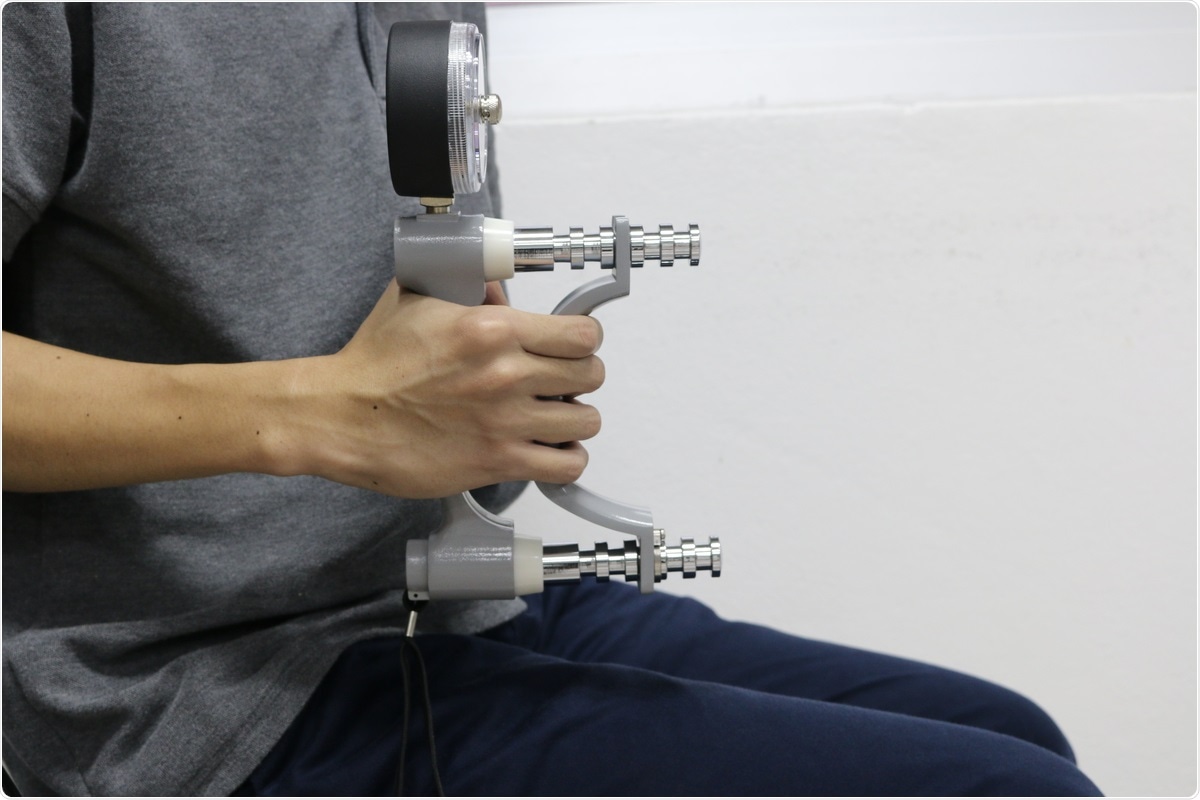Researchers found that coronavirus disease 2019 (COVID-19) patients with good muscle strength and higher muscle mass had a shorter stay in the hospital.
COVID-19 has had a wide range of different effects on people. Some develop severe or critical disease, sometimes resulting in death, whereas others show no symptoms at all. The elderly and people with other underlying diseases like diabetes and hypertension seem to have a greater susceptibility to severe or life-threatening COVID-19.
However, there have been reports where younger, apparently healthy individuals have also been hospitalized and have poor disease outcomes, suggesting there may be other features that affect disease progression. One such factor is muscles.
Muscles make up about 40% of our body mass and play an important role in several body processes such as immune response, blood glucose regulation, and basal metabolic rate. Studies have shown that handgrip strength and muscle mass are related to disease outcomes, such as length of hospital stay and death. However, this relation has not be explored in COVID-19 patients.
Researchers from Universidade de Sao Paulo in Brazil and Robert Gordon University in the United Kingdom studied if muscle strength and muscle mass determined at the time of hospital admission of COVID-19 patients with moderate to severe disease could predict the length of hospital stay. They published their results in the medRxiv* preprint server.

Exploring muscle mass and hospital stay
The team conducted the study between March 2020 and October 2020 at the Clinical Hospital of the School of Medicine at the University of Sao Paulo. The participants were adults with a confirmed COVID-19 test, who needed to be hospitalized based on symptoms.
Upon admission, the team tested the handgrip strength and the size of the thigh muscle, using ultrasonography, of the patients. Handgrip strength is a simple and low-cost measurement and is common in clinical settings to provide an indicator of the general health of individuals across all ages. Studies have also shown that low muscle mass can predict mortality among older adults.
Of the total 196 patients recruited, half were male, and the average age was 59 years. The most common other conditions the patients had were hypertension, obesity, and diabetes.
The team estimated hazard ratios and found that it was greatest for handgrip strength when comparing the strongest to other patients. When standardized according to sex, increased handgrip strength was associated with a shorter hospital stay. The strongest patients stayed an average of 7.5 days compared to about 9 days for others.
The authors also found an association between the size of the thigh muscle and hospital stay, with patients having a large cross-sectional area of the muscle having shorter hospital stays, about 7.7 days compared to about 10.8 for those with smaller areas of the muscle.
Lower muscle mass increased length of hospital stay
Although previously, clinical frailty scores have been used to predict mortality and time to hospital discharge in COVID-19 patients, the scores are based on judgment and need experience and training in properly categorizing patients. In addition, this tool is mainly used in elderly patients, limiting its use in COVID-19 scenarios.
The study results indicate that low muscle mass could lead to a higher length of hospital stay for COVID-19 patients, although it is not clear if this method could add to prognostic tests. When a person is ill, muscle protein is broken down to provide enough amino acids to meet the extra demand of organs like the liver and the immune system. People with lower muscle mass would be more vulnerable to stresses such as cancers. This may also be happening in COVID-19 patients.
However, the authors note that the study does not allow for drawing causative conclusions. The sample size was small, with patients having different disease manifestations and medication, which could have led to confounding factors. The minimum clinically important differences for length of stay among the patients studied is as yet unknown; hence adequate clinical inferences cannot be made.
Muscle mass is important for recovery from illness, and muscle strength and functions are key to the recovery process. If there is low muscle mass before one falls severely ill, it is possible that loss of muscle and muscle function during hospitalization could make it more difficult for the patient to recover. The long-term effects of this mechanism need to be further explored.
*Important Notice
medRxiv publishes preliminary scientific reports that are not peer-reviewed and, therefore, should not be regarded as conclusive, guide clinical practice/health-related behavior, or treated as established information.
- Gil, S. et al. (2021) Muscle Strength and Muscle Mass as Predictors of Hospital Length of Stay in Patients with Moderate to Severe COVID-19: A Prospective Observational Study. medRxiv.https://doi.org/10.1101/2021.03.30.21254578, https://www.medrxiv.org/content/10.1101/2021.03.30.21254578v1
Posted in: Medical Research News | Miscellaneous News | Disease/Infection News | Healthcare News
Tags: Blood, Coronavirus, Diabetes, Glucose, Hospital, Immune Response, Immune System, Liver, Medicine, Mortality, Muscle, Obesity, Protein

Written by
Lakshmi Supriya
Lakshmi Supriya got her BSc in Industrial Chemistry from IIT Kharagpur (India) and a Ph.D. in Polymer Science and Engineering from Virginia Tech (USA).
Source: Read Full Article





